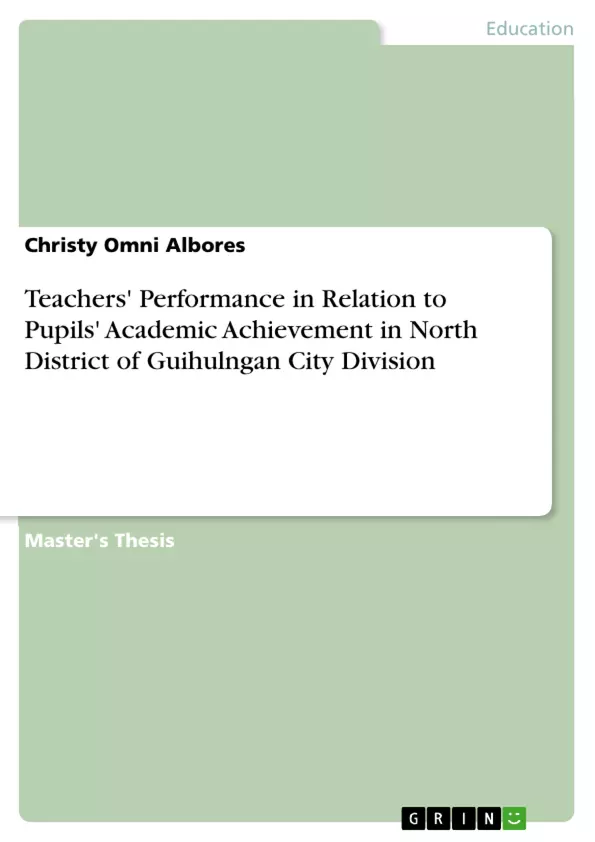This study focused on the Grade V teachers’ performance based on CB-PAST (Competency-Based Performance Appraisal System for Teachers) of the North District of Guihulngan City Division, Negros Oriental in relation to pupils’ academic achievement during the 1st grading period of school year 2012 – 2013.
This research work included the 34 Grade V teachers and 1105 Grade V pupils as the research subjects from the twenty – six complete elementary schools of the North District of Guihulngan City Division. To ensure success and effectiveness of this study, the researcher utilized the descriptive and documentary survey method. Data gathering instrument was used for documentary analysis. The researcher gathered the data on teaching performance of Grade V teachers from their CB – PAST This method used was appropriate as it attempts to organize, analyze and interpret data on the status of a thing.
Table of Contents
- I. THE PROBLEM AND ITS SCOPE
- Introduction
- Statement of the Problem
- Hypothesis
- Conceptual Framework
- Definition of Terms
- Significance of the Study
- Scope and Limitation of the Study
- II. REVIEW OF RELATED LITERATURE
- Conceptual Literature
- Related Studies
- III. METHODOLOGY
- Method Used
- Research Locale
- Research Subjects
- Data Gathering Procedure
Objectives and Key Themes
This thesis examines the relationship between a competency-based performance appraisal system and pupils' academic achievement for teachers. The study aims to determine the effectiveness of this system in improving student learning outcomes.
- Evaluation of the effectiveness of a competency-based performance appraisal system
- Relationship between teacher performance and student achievement
- Impact of the appraisal system on teacher motivation and professional development
- Factors influencing the implementation and success of the system
- Recommendations for improving the appraisal system and enhancing student outcomes
Chapter Summaries
Chapter I presents the research problem, including the statement of the problem, hypothesis, conceptual framework, definition of terms, significance of the study, and scope and limitation of the study. It provides a comprehensive overview of the research context and objectives.
Chapter II explores relevant literature related to the topic, encompassing both conceptual literature and related studies. This chapter examines existing research on competency-based performance appraisal systems, their impact on teachers, and the relationship between teacher performance and student achievement.
Chapter III outlines the methodology used in the study, including the research locale, subjects, data gathering procedures, and analysis techniques. It provides a detailed description of the research design and methods employed to collect and analyze data.
Keywords
This research focuses on the relationship between teacher performance, as measured by a competency-based performance appraisal system, and student academic achievement. The study investigates the effectiveness of the system in improving teacher performance and student learning outcomes. Key concepts include competency-based appraisal, teacher performance, student achievement, and the impact of the appraisal system on teacher motivation and professional development.
- Citation du texte
- Christy Omni Albores (Auteur), 2013, Teachers' Performance in Relation to Pupils' Academic Achievement in North District of Guihulngan City Division, Munich, GRIN Verlag, https://www.grin.com/document/512759



